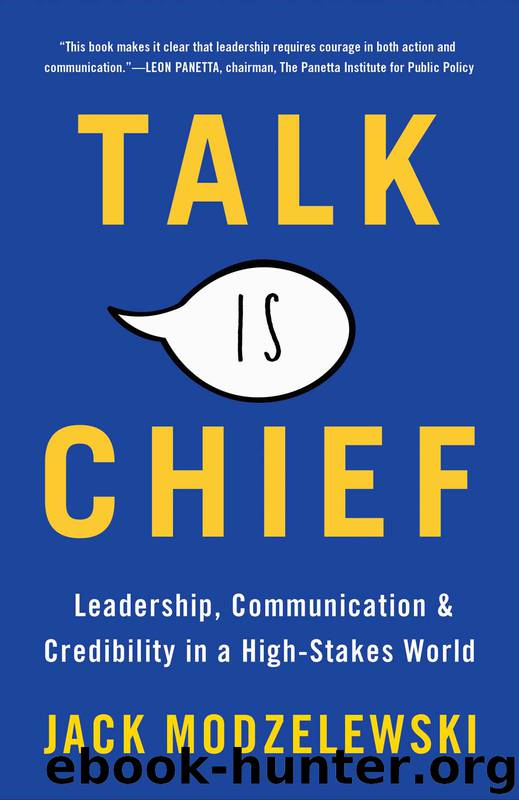Talk is Chief: Leadership, Communication & Credibility in a High-Stakes World by Jack Modzelewski

Author:Jack Modzelewski
Language: eng
Format: epub
Publisher: RosettaBooks LLC
Published: 2019-03-06T16:00:00+00:00
Earned vs. Paid Media
I believe that even in this era of 24-7 news and social media channels, you don’t have to be out there talking about yourself all the time, even if you are a big global company. But you must be opportunistic, paying close attention to trend lines and current events, and pick spots where your perspective on a developing story—in or outside your industry—results in valuable visibility for your organization. This is known in the parlance of public relations as “earned media.” It’s earned because you did not have to buy it as you do with advertising (known as “paid media”).
As a former journalist and successful PR representative, I spent a good portion of my early career assisting clients with earned media. Viewed as a go-to intermediary with reporters, my job was to help clients figure out how they could make their narratives more compelling to news organizations—and then go make it happen.
This meant working closely with subject-matter experts in my clients’ organizations, developing what we thought were compelling stories, or contributing pieces for broader industry or trend stories. Each “storyline” or theme was supported by facts, research, government reports, anecdotes, visuals, and customer testimonials. Acting as an intermediary between the client and a news organization—a newspaper, magazine, TV network—I would pitch the stories to specific reporters and editors. Some of the reporters and editors knew me; many did not. Having been a reporter, however, I operated under the principle that I would never pitch a story idea that I would reject were I the reporter in question.
I made it a point to communicate the story idea in sixty seconds or less on a phone call, or in a few paragraphs in a letter (and in fewer words yet when the age of email became commonplace). While this practice is commonly known as media relations, I call it media negotiations. Relationships with news media professionals—as with any professionals—are important. But relationships, even friendships, won’t get you a story if the reporter or editor is not impressed.
It still works if a person understands what journalists want and need to report their news and feature stories. Being a journalist-turned-media-relations pro helps, but the real skill is in research and creativity—researching topics and subject matter thoroughly across media with an eye toward finding story opportunities that have not yet been reported. In leadership communication, emotional intelligence and a little bit of heart complements rational arguments.
I’ve had clients look upon competitors’ favorable media coverage with envy, especially when those competitors capitalized on or—even better—anticipated a trend and made themselves centerpieces of significant stories. They would say things like, “We should have been in that story in the New York Times or in Fortune,” or “Why were we not in that nice piece on NBC seen by millions of people?” But the company had to figure out what their story was and put their confidence in people who could help them make those stories happen. In the old days, this was a form of media relations known as “placing stories.
Download
This site does not store any files on its server. We only index and link to content provided by other sites. Please contact the content providers to delete copyright contents if any and email us, we'll remove relevant links or contents immediately.
Hit Refresh by Satya Nadella(9115)
The Compound Effect by Darren Hardy(8918)
Change Your Questions, Change Your Life by Marilee Adams(7732)
Nudge - Improving Decisions about Health, Wealth, and Happiness by Thaler Sunstein(7689)
The Black Swan by Nassim Nicholas Taleb(7097)
Deep Work by Cal Newport(7056)
Rich Dad Poor Dad by Robert T. Kiyosaki(6591)
Daring Greatly by Brene Brown(6500)
Principles: Life and Work by Ray Dalio(6401)
Playing to Win_ How Strategy Really Works by A.G. Lafley & Roger L. Martin(6206)
Man-made Catastrophes and Risk Information Concealment by Dmitry Chernov & Didier Sornette(5996)
Digital Minimalism by Cal Newport;(5745)
Big Magic: Creative Living Beyond Fear by Elizabeth Gilbert(5743)
The Myth of the Strong Leader by Archie Brown(5491)
The Slight Edge by Jeff Olson(5405)
Discipline Equals Freedom by Jocko Willink(5371)
The Motivation Myth by Jeff Haden(5202)
The Laws of Human Nature by Robert Greene(5154)
Stone's Rules by Roger Stone(5077)
